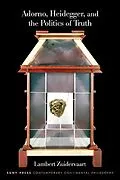An elusive and complex idea of truth lies at the center of Theodor Adorno's thought. Yet he never spells out what it is. Through close readings of Negative Dialectics, Aesthetic Theory, and related course lectures, Lambert Zuidervaart reconstructs Adorno's conception of truth, contrasts it with the conceptions of Martin Heidegger and Michel Foucault, and explores its relevance for contemporary philosophy, art, and politics. Adorno regards truth as a dynamic constellation in which various dialectical polarities intersect. The most decisive polarity, Zuidervaart argues, occurs between society as it has developed and the historical possibility of a completely transformed world. Critically reconstructed, Adorno's conception of truth can help inspire hopeful critiques of an allegedly post-truth society.
Autorentext
Lambert Zuidervaart is Emeritus Professor of Philosophy at the Institute for Christian Studies and the University of Toronto. His many books include Social Domains of Truth: Science, Politics, Art, and Religion and Shattering Silos: Reimagining Knowledge, Politics, and Social Critique.
